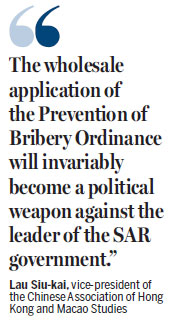Extending bribery law to CE unwise, warns expert
Updated: 2015-10-07 08:38
By Shadow li in Hong Kong(HK Edition)
|
|||||||
Caution urged due to potential for graft charges to be used as political weapon
Extending anti-bribery laws meant for civil servants without due consideration to the Chief Executive's unique role would tie the hands of the city's leadership and lead to further political deadlock, a political scientist has warned.
Charges of misconduct in public office leveled at former CE Donald Tsang Yam-kuen have renewed calls to extend anti-bribery laws to the CE - despite existing prohibitions on soliciting or accepting advantages.
But the dual role of the office of CE - as elected leader of Hong Kong and appointed representative of the central government - necessitates a careful approach with plenty of sober second thoughts, opponents of the idea say.
Political scientist Lau Siu-kai warned the wholesale application of the Prevention of Bribery Ordinance would invariably become a political weapon against the leader of the SAR government, hindering Hong Kong's executive-led form of government and handing yet another tactic to the opposition's arsenal of non-cooperation and filibuster.
The CE could come under fire for any number of trivial reasons launched for political ends, endangering the smooth operation of the government and the implementation of necessary administration, Lau said.
Echoing former secretary for justice Elsie Leung Oi-sie's comments that not even CEs are above the law, Lau, the vice-president of the Chinese Association of Hong Kong and Macao Studies, said existing checks and balances sufficed. This is because the CE is already subject to the Legislative Council's scrutiny and lawmakers collectively wield the right to impeach the CE in the event of a serious offense.
A blanket application of Hong Kong's anti-corruption laws - which were designed to regulate public servants - is a ham-fisted approach, according to Executive Council Chairman of the China-Australia Legal Exchange Foundation Lawrence Ma Yan-kwok. He noted the ordinance was to guide the conduct of public servants on social occasions when presented with expensive souvenirs or valuable presents.
The law's tailoring was belied by the fact public servants are required to report any gifts to their superiors, while the CE stood at the top of the city's administration second only to the central government.
Former chief justice of the Court of Final Appeal Andrew Li Kwok-nang suggested establishing an independent statutory body to oversee the CE's behavior.
But Lau dismissed the suggestion as problematic, since a CE could become beholden to interests within the body. This might affect his actions, which would otherwise be free of fear or favor.
stushadow@chinadailyhk.com

(HK Edition 10/07/2015 page4)